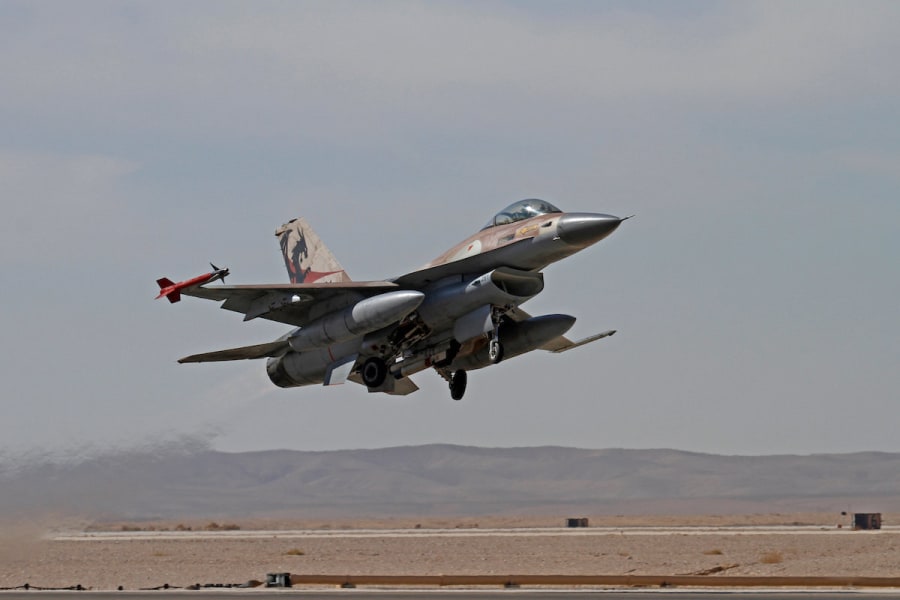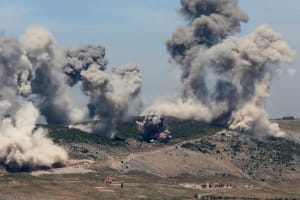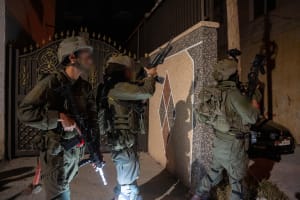Israel concerned Western sanctions on Russia could undermine Jerusalem’s military missions in Syria
Though Israel has maintained neutrality in the Russia-Ukraine standoff so far, some officials are indicating a tilt in Washington's direction

Israel is reportedly concerned that Western sanctions against Russia over the Ukraine conflict could potentially undermine the Jewish state’s extensive military operations against Iranian targets in Syria.
The Israel Air Force has so far enjoyed extensive freedom of action in Syria due to Jerusalem’s complex but solid ties and crucial coordination with Russia, which maintains a significant military presence in Syria. Unlike most Western democracies, Israel has refrained from clearly taking sides in the escalating conflict between Russia and Ukraine. However, increased U.S. and Western pressures on Israel could eventually force Jerusalem to openly side with the West against Russia.
An unnamed Israeli security official told Israel's Walla news site about Israel’s dilemma of being caught in the crossfire between the United States and Russia.
“U.S. sanctions against Russia put Israel in a very embarrassing position. The United States is a long-standing stable ally, but Israel needs Russia given the circumstances in the Middle East,” the Israeli official said.
When asked by Israeli Channel 12 on Sunday whether Jerusalem is considering joining the Washington-led Western sanctions against Russia, Israeli Foreign Minister Yair Lapid evasively responded that Israel “will consider what course to take.”
Lapid recently told the Conference of Presidents of Major American Jewish Organizations’ mission to Israel that the Jewish state was “in a bit of a Baltic situation” when it comes to Israel’s complex relationship with Russia.
“We have a kind of border with Russia... the important force inside Syria,” stated Lapid. As the world’s only Jewish state, Israel also feels responsible for the safety of hundreds of thousands of Jews living on both sides of the border between Ukraine and Russia.
Israeli Prime Minister Naftali Bennett, who is eager to maintain good relations with both Washington and Moscow, has so far kept a low profile in the escalating conflict between Russia and the West. By contrast, in an interview on Monday, Israeli Transportation Minister Merav Michaeli placed Israel on Washington’s side.
“There is no question that the special relationship that Israel has with the United States, that this government is working to rehabilitate and rebuild, is not the same relationship that Israel has with Russia,” Michaeli said.
Israeli Diaspora Minister Nachman Shai was even more clear in articulating a pro-American position.
“Our heart is in the direction of the United States,” said Shai who simultaneously stressed that the Israeli government preferred not to “take a clear public position, with the great hope that this crisis will end without fire, without casualties and without a military confrontation.”
Russian and Israeli interests in Syria differ, but both Moscow and Jerusalem are interested in stabilizing the country. Russian President Vladmir Putin has so far expressed his understanding Israel’s military need to prevent Iranian-led forces from threatening Israel from Syria. Moscow has consequently remained largely quiet as Israel has so far conducted hundreds of military operations against Iranian targets inside Syria. However, Russia recently increased its criticism of Israeli military operations in Syria.
"Israel’s continuing strikes against targets inside Syria cause deep concern. They are a crude violation of Syria’s sovereignty and may trigger a sharp escalation of tensions. Also, such actions pose serious risks to international passenger flights,” Russian Foreign Ministry spokeswoman Maria Zakharova said earlier in February.
When virtually the entire Western world condemned Russia for annexing Crimea in Ukraine in 2014, former Israeli Prime Minister Benjamin Netanyahu remained silent and refrained from criticizing Moscow. Jerusalem’s neutral position on Ukraine played a crucial role in cementing a close political understanding between Putin and Netanyahu that Israeli officials believe greatly facilitated Israel’s military operational freedom in Syria.
As the United States gradually retreats from the Middle East, Israel is increasingly nervous about the Russian presence and influence in neighboring Syria and beyond. In late January, Russia declared that it had conducted the first joint air patrol with the Syrian air force along the border between Syria and Israel. This dramatic development prompted Israeli officials to conduct military talks with Moscow.
Last week, Russia deployed nuclear-capable bombers and fighter jets to Syria for the largest Russian naval military drill in the Mediterranean region since the Cold War.
While the Ukraine conflict will hopefully end soon without excessive bloodshed, Russia is not leaving Syria any time soon.

The All Israel News Staff is a team of journalists in Israel.













